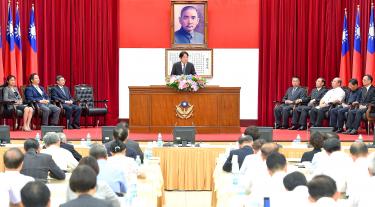The Chinese government is using online content farms to create fake news to manipulate Taiwanese public opinion and polarize society, the Ministry of Justice’s Investigation Bureau said, citing a bureau analysis of several online articles that have stirred controversy in Taiwan.
The bureau has established a big-data and public opinion task force to monitor the spread of fake news on social media on instructions from the National Security Bureau, it said on Friday.
The probe found “unequivocal evidence” that Beijing was responsible for several fake news articles that aimed to manipulate Taiwanese public opinion, it said.
For example, state-run China Central Television has aired footage of old military exercises to lend credence to a false report that the Chinese People’s Liberation Army Air Force conducted a live-fire exercise in waters off southwest China, it said.
National security agencies later confirmed that machine guns were fired during the exercise, but that Chinese media exaggerated the drill’s scope to cause panic in Taiwan, the Investigation Bureau said.
Chinese content farms have also on multiple occasions spread disinformation about cross-strait relations, it said.
Qiqi Kan Xinwen (琦琦看新聞), one of the Web sites running fake news articles, in May said that Taiwan’s indigenous submarine program was aimed at blockading Chinese ports, while coco02.net claimed that China “will reclaim Taiwan by 2020” to sow fear, the bureau added.
Dafeng Hao (大風號) has claimed that the Democratic Progressive Party (DPP) is using national security as a pretext to block Chinese policies that are favorable toward Taiwan and that the party is “abetting” a referendum bid by independence advocates to change the nation’s name at the Tokyo 2020 Olympics from “Chinese Taipei,” the Investigation Bureau said.
It said it would facilitate the government’s public information campaigns to counter China’s influence operations by providing real-time intelligence to government agencies.
The bureau said it is a non-political and neutral agency whose mission is to protect domestic security and social order, and that it would enhance its capabilities to monitor and combat fake news, including prosecuting those who break the law by spreading fake news.
The National Security Bureau said its sources have confirmed that China and other hostile forces have been waging media and psychological warfare against Taiwan.
Russia’s alleged interference in the 2016 US presidential elections and China’s meddling in Cambodia’s general election have raised concerns among security agencies worldwide, it said.
Democratic nations like the US, France, Germany and Japan have responded by passing laws to manage fake news that threaten national security, it added.
“China’s Internet brigade is clearly spreading fake news, and its activities will have an immense effect on Taiwan’s democratic system and elections,” National Taiwan University political science associate professor Chen Shih-min (陳世民) said.
An example of China-based fake news is a story about banana overproduction that was published in June, he said, adding that an image showing piles of the fruit was shared online and later turned out to be a stock photograph taken in 2007.
In another case, an article falsely claimed that Taiwanese bananas contained unsafe levels of pesticide residue, and used a picture that showed Premier William Lai (賴清德) and Legislative Speaker Su Jia-chyuan (蘇嘉全) handling bananas while wearing gloves, he said.
Lai and Su were in fact making banana spring rolls at a promotional event, Chen said.
“Fake news is created by taking images or words out of context. It is often created to serve an agenda, such as discrediting the government or stirring public discontent,” he said. “Many of the stories bear the Chinese government’s mark.”
However, the nation’s Internet ecosystem is in such a shape that China does not really need an Internet brigade to manipulate Taiwanese public opinion or to spread fake news, he said.
While the government clearly needs to take action against disinformation, the response has to be measured to ensure that the freedom of speech is protected, Chen said.
Transparency and public communication are probably more important in maintaining the government’s credibility, he said.
Taiwan Thinktank researcher Tung Li-wen (董立文) said that the government should be more proactive and make better use of available tools to counter fake news.
“The government cannot expect posting statements on official Web sites to fix the problem. Most of the public does not bother to look at official Web sites,” he said, adding that prosecutors should enforce laws against the malicious and deliberate spreading of disinformation.
In related news, President Tsai Ing-wen (蔡英文), who doubles as DPP chairperson, yesterday accused China of spreading fake news to discredit DPP Taichung Mayor Lin Chia-lung (林佳龍), who is seeking re-election in the Nov. 24 nine-in-one elections.
“Lin’s opponent in the election is not the only party that is manipulating information. There is a lot of fake news from dubious sources and some of those are in China,” Tsai said at the opening ceremony for Lin’s campaign headquarters. “Disinformation damages the public’s trust in the government, polarizes society and intensifies partisanship in political elections.”
Chinese Nationalist Party (KMT) Acting Deputy Director-General of Culture and Communications Tang Te-ming (唐德明) responded by saying: “The DPP and Chairperson Tsai are never wrong, it is always the KMT and the Chinese communists’ fault.”
Additional reporting by Aaron Tu and Su Chin-feng
Source: Taipei Times - 2018/09/16









